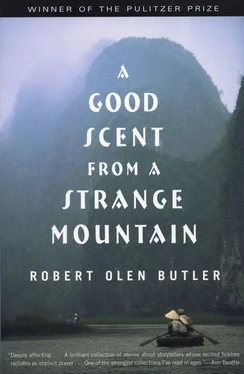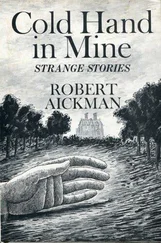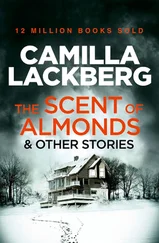I said, “No. I am Vietnamese,” but I did not raise my face to him, and he went away.
Two days later, it was even earlier in the day when Mr. Cohen came in. About four-thirty. The grandfather had just chimed the half hour like a man who is really crazy about one subject and talks of it at any chance he gets. I was sitting in my chair at the front once again and my first thought when I saw Mr. Cohen coming through the door was that he would think I am a lazy girl. I started to jump up, but he saw me and he motioned with his hand for me to stay where I was, a Single heavy pat in the air, like he’d just laid this large hand of his on the shoulder of an invisible child before him. He said, “I’m early again.”
“I am not a lazy girl,” I said.
“I know you’re not,” he said and he sat down in the chair across from me.
“How do you know I’m not?” This question just jumped out of me. I can be a cheeky girl sometimes. My mother says that this was one reason I am not married, that this is why she always talks about the boy I was once going to marry in Vietnam, because he was a shy boy, a weak boy, who would take whatever his wife said and not complain. I myself think this is why he is driving a taxi in H  Chí Minh City. But as soon as this cheeky thing came out of my mouth to Mr. Cohen, I found that I was afraid. I did not want Mr. Cohen to hate me.
Chí Minh City. But as soon as this cheeky thing came out of my mouth to Mr. Cohen, I found that I was afraid. I did not want Mr. Cohen to hate me.
But he was smiling. I could even see his white teeth in this smile. He said, “You’re right. I have no proof.”
“I am always sitting here when you come in,” I said, even as I asked myself, Why are you rubbing on this subject?
I saw still more teeth in his smile, then he said, “And the last time you were even sleeping.”
I think at this I must have looked upset, because his smile went away fast. He did not have to help me seem a fool before him. “It’s all right,” he said. “This is a slow time of day. I have trouble staying awake myself. Even in court.”
I looked at him more closely, leaving his face. He seemed very prosperous. He was wearing a suit as gray as his beard and it had thin blue stripes, almost invisible, running through it. “You are a judge?”
“A lawyer,” he said.
“You will defend me when the owner fires me for sleeping.” This made Mr. Cohen laugh, but when he stopped, his face was very solemn. He seemed to lean nearer to me, though I was sure he did not move. “You had a bad dream the last time,” he said.
How did I know he would finally come to ask about my dream? I had known it from the first time I’d heard his voice. “Yes,” I said. “I think I was dreaming about the first Christmas Eve I spent in America. I fell asleep before a window in a restaurant in St. Louis, Missouri. When I woke, there was snow on the ground. It was the first snow I’d ever seen. I went to sleep and there was still only a gray afternoon, a thin little rain, like a mist. I had no idea things could change like that. I woke and everything was covered and I was terrified.”
I suddenly sounded to myself like a crazy person. Mr. Cohen would think I was lazy and crazy both. I stopped speaking and I looked out the window. A jogger went by in the street, a man in shorts and a T-shirt, and his body glistened with sweat. I felt beads of sweat on my own forehead like little insects crouching there and I kept my eyes outside, wishing now that Mr. Cohen would go away.
“Why did it terrify you?” he said.
“I don’t know,” I said, though this wasn’t really true. I’d thought about it now and then, and though I’d never spoken them, I could imagine reasons.
Mr. Cohen said, “Snow frightened me, too, when I was a child. I’d seen it all my life, but it still frightened me.”
I turned to him and now he was looking out the window.
“Why did it frighten you?” I asked, expecting no answer.
But he turned from the window and looked at me and smiled just a little bit, like he was saying that since he had asked this question of me, I could ask him, too. He answered, “It’s rather a long story. Are you sure you want to hear it?”
“Yes,” I said. Of course I did.
“It was far away from here,” he said. “My first home and my second one. Poland and then England. My father was a professor in Warsaw. It was early in 1939. I was eight years old and my father knew something was going wrong. All the talk about the corridor to the sea was just the beginning. He had ears. He knew. So he sent me and my mother to England. He had good friends there. I left that February and there was snow everywhere and I had my own instincts, even at eight. I cried in the courtyard of our apartment building. I threw myself into the snow there and I would not move. I cried like he was sending us away from him forever. He and my mother said it was only for some months, but I didn’t believe it. And I was right. They had to lift me bodily and carry me to the taxi. But the snow was in my clothes and as we pulled away and I scrambled up to look out the back window at my father, the snow was melting against my skin and I began to shake. It was as much from my fear as from the cold. The snow was telling me he would die. And he did. He waved at me in the street and he grew smaller and we turned a corner and that was the last I saw of him.”
Maybe it was foolish of me, but I thought not so much of Mr. Cohen losing his father. I had lost a father, too, and I knew that it was something that a child lives through. In Vietnam we believe that our ancestors are always dose to us, and I could tell that about Mr. Cohen, that his father was still dose to him. But what I thought about was Mr. Cohen going to another place, another country, and living with his mother. I live with my mother, just like that. Even still.
He said, “So the snow was something I was afraid of. Every time it snowed in England I knew that my father was dead. It took a few years for us to learn this from others, but I knew it whenever it snowed.”
“You lived with your mother?” I said.
“Yes. In England until after the war and then we came to America. The others from Poland and Hungary and Russia that we traveled with all came in through New York City and stayed there. My mother loved trains and she’d read a book once about New Orleans, and so we stayed on the train and we came to the South. I was glad to be in a place where it almost never snowed.”
I was thinking how he was a foreigner, too. Not an American, really. But all the talk about the snow made this little chill behind my thoughts. Maybe I was ready to talk about that. Mr. Cohen had spoken many words to me about his childhood and I didn’t want him to think I was a girl who takes things without giving something back. He was looking out the window again, and his lips pinched together so that his mouth disappeared in his beard. He seemed sad to me. So I said, “You know why the snow scared me in St. Louis?”
He turned at once with a little humph sound and a crease on his forehead between his eyes and then a very strong voice saying, “Tell me,” and it felt like he was scolding himself inside for not paying attention to me. I am not a vain girl, always thinking that men pay such serious attention to me that they get mad at themselves for ignoring me even for a few moments. This is what it really felt like and it surprised me. If I was a vain girl, it wouldn’t have surprised me. He said it again: “Tell me why it scared you.”
I said, “I think it’s because the snow came so quietly and everything was underneath it, like this white surface was the real earth and everything had died — all the trees and the grass and the streets and the houses — everything had died and was buried. It was all lost. I knew there was snow above me, on the roof, and I was dead, too.”
Читать дальше

 Chí Minh City. But as soon as this cheeky thing came out of my mouth to Mr. Cohen, I found that I was afraid. I did not want Mr. Cohen to hate me.
Chí Minh City. But as soon as this cheeky thing came out of my mouth to Mr. Cohen, I found that I was afraid. I did not want Mr. Cohen to hate me.










